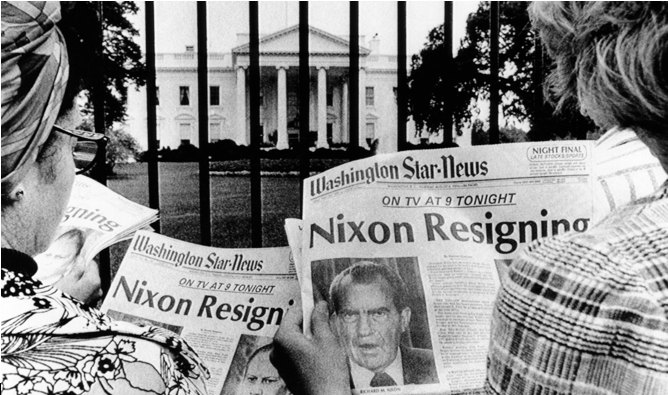CommentsGELFAND’S WORLD--Serious thinkers have been comparing the current situation in the U.S. with Germany and Italy in the 1930s. There is some legitimacy to this comparison, particularly in terms of the use of bullying and propaganda at the highest levels of government. But it's also fair to look back at the 1960s and '70s, to the aftermath of the civil rights movement and Viet Nam, and to the slow bloodletting of the Watergate affair. The way those events played out offer some clues as to how the Trump affair will itself play out.
What do they all have in common? For one, they represent stark breaks from the status quo of the day. The Jim Crow, segregationist society was changed permanently, a nation at peace since the Korean War turned against itself over an undeclared war, and the presidency itself was tarnished by crime and cover up. Words like revolutionary can be used to describe the tumult.
In the post-Watergate era, it was hard for Americans to pretend that the nation was without blemishes or that our leadership was always trustworthy. It was fashionable for commentators to use phrases like "this nation, for all its faults and for all that we must do to repair those faults, remains the greatest country on earth." You would have noticed that what we think of as American exceptionalism took a big hit back then. Those with a long enough memory will recall that it was, curiously enough, the First Gulf War that signaled the end to the culture of self-flagellation that we had been enduring. The older President Bush had suggested that whatever position anyone had taken in the Viet Nam protest era, there should be the equivalent to a statute of limitations on blame.
Another thing about that era and its events: Not only did the civil rights movement, Viet Nam, and Watergate signify revolutionary changes, they were also national embarrassments. Jim Crow and segregation were an embarrassment for obvious reasons. The Viet Nam conflict created distinct unpopularity overseas, and Watergate speaks for itself.
We are now going through a moment which holds distinct parallels in terms of the revolutionary aspect of the Republican takeover and the international embarrassment that is Donald Trump.
The point I'm reaching for is that at least in the early- to mid-1970s, Americans spoke about American exceptionalism in more hushed tones and, often enough, prefaced by the admission that as a nation, we had sinned. The current generation of Trump supporters seems to be rebelling against the idea that we could or should regret or apologize for anything.
This raises the question which shall, I suspect, remain of paramount interest for a while: At what point if ever will Trump supporters begin to realize, and having realized, admit, that Trump is unadulterated poison to democracy and to the country's well being. When will they talk of American exceptionalism prefaced by admissions of imperfection?
In particular, at what point will a substantial majority of the American public recognize that you cannot tell whether Trump is telling the truth or spinning a yarn -- about anything -- ever?
We can imagine a not so distant future when it will be possible to ask with a straight face, "Which Trump are you talking about, the birther Trump or the later Trump, following his admission that Obama was born in the United States? Which Trump are you talking about, the Trump who claimed that Obama bugged the Trump Tower, or the later Trump?
Bernie Sanders …asks, "What should we do if the president is a liar?" A tough question, indeed.
The Republican answer to the Affordable Care Act
Well, this is one of the emergencies we have been predicting and dreading. The House of Representatives now has a bill to replace Obamacare with its own version. As several analysts have pointed out, it's really just a tax cut for the rich which makes up for some of the federal income reduction by reducing the subsidies that poorer people on Obamacare and Medicaid have been getting. You can fill in your own reverse Robin Hood joke here, but it's potentially less of a joke and more of an American disaster.
So far, the hard right also dislikes the proposal, but in their case, it's because the bill isn't cruel enough.
Another thing -- when Trump was on the campaign trail, he made brash promises about fixing the whole health insurance problem so that everybody gets great care and we all spend less money. It was a typical Trump approach to campaigning -- make grandiose promises backed up by nothing but bluster, mix in a dollop of hate towards foreigners, stir, and collect the votes. It will be a big question for historians whether Trump believed his own claims or whether it was just a con. Either interpretation speaks badly of the candidate and of the country that elected him.
(Bob Gelfand writes on science, culture, and politics for CityWatch. He can be reached at [email protected])
-cw
Explore
Our mission is to promote and facilitate civic engagement and neighborhood empowerment, and to hold area government and its politicians accountable.

 CityWatch Los Angeles
Politics. Perspective. Participation.
CityWatch Los Angeles
Politics. Perspective. Participation.
26
Sat, Apr















